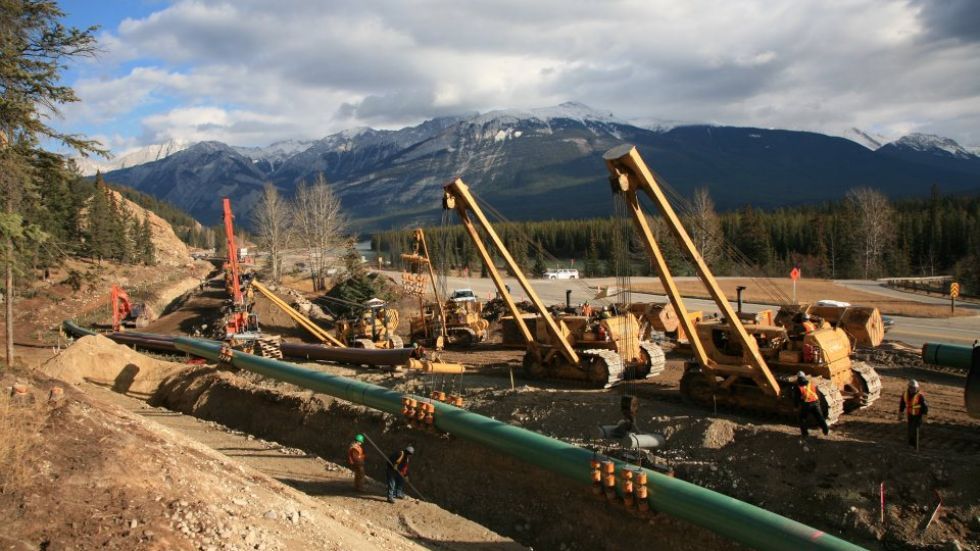 By Laura Kane, The Canadian Press
By Laura Kane, The Canadian Press
Vancouver: The National Energy Board says the contentious $6.8-billion Trans Mountain pipeline expansion is in Canada’s best interests, despite increased greenhouse gas emissions and threats to killer whales off British Columbia’s coast.
The federal regulator issued its long-awaited report on Thursday after a two-year debate that cost millions, and galvanized aboriginal and environmental protests. The board recommended Ottawa approve Kinder Morgan Canada’s proposal subject to 157 conditions.
“Given that there are considerable benefits nationally, regionally and locally, the board found that the benefits of the project would outweigh the residual burdens,” Robert Steedman, the board’s chief environmental officer, told a news conference.
“Accordingly, the board concludes that the project is in the Canadian public interest.”
Kinder Morgan wants to triple the capacity of its existing Trans Mountain pipeline, which carries diluted bitumen from oilsands near Edmonton to Burnaby, B.C., for export. The expansion would bring capacity to 890,000 barrels a day and increase tanker traffic in Burrard Inlet seven-fold.
The positive recommendation has cleared a major hurdle for the project, with Prime Minister Justin Trudeau’s cabinet set to make a final decision by the end of the year.
But Kinder Morgan would have to address 157 environmental, safety and financial conditions, including holding $1.1 billion in liability coverage and detailing its plans to protect endangered species. The board said the project is the first to be required to detail plans for offsetting emissions.
There was fierce opposition to the project and the process throughout the energy board’s hearing, with the British Columbia government and cities of Vancouver and Burnaby opposing the expansion. The Tsleil-Waututh Nation in North Vancouver has a case before the Federal Court that argues the process was unlawful.
But the board concluded the project presents significant benefits to Canada, including increased access to diverse markets for Canadian oil, thousands of construction jobs and hundreds of long-term jobs, development opportunities for indigenous and local communities and considerable government revenues.
Kinder Morgan said in a statement it was “pleased” the board had recommended approval of the project.
The board said that it considered concerns expressed by First Nations and how the project and related tanker traffic could impact indigenous interests. Should the project proceed, Kinder Morgan would be required to continue consultation with affected indigenous groups throughout the life of the project.
The board’s report noted that even with conditions, some impacts remain. For example, the board found that marine vessels related to Trans Mountain would further contribute to cumulative effects that are already jeopardizing the recovery of the southern resident killer whale population off B.C.’s coast.
The report also said future vessel traffic would contribute to an increase in Canadian greenhouse gas emissions. While emissions from project-related vessels would encompass a small percentage of the country’s overall emissions, the board concluded they would likely be “significant.”
The board also considered the likelihood and potential consequences of a large spill from the project or a tanker. It concluded these events would be of very low probability given the mitigation and safety measures being implemented, but nonetheless a very large spill would have a significant effect.
Alberta has been a strong proponent of the pipeline expansion. Energy Minister Margaret McCuaig-Boyd described the board’s decision as a good balance between the need for stronger action on climate change and the sustainable development of Canada’s natural resources.
“Finding this balance will create jobs and economic prosperity, and help Canada overcome the current commodity price shock,” she said in a statement.
“Canadians want to know that sustainable resource development will be pursued safely. A modern, carefully regulated, carefully monitored pipeline is the safest and most economical way to move energy products to market.”
Peter McCartney, a climate campaigner with the Wilderness Committee, said the project has no social licence and will not be built.
“I shouldn’t be surprised, but this is an outrageous decision. The NEB has ignored and wasted the time of countless communities, First Nations and individuals who have stood up to oppose this irresponsible pipeline proposal,” he said in a statement.
The board spent 25 months deliberating over the Trans Mountain expansion application, which was submitted in December 2013. In addition to evidence from Kinder Morgan, the board heard from 35 indigenous groups, 400 interveners and 1,250 other parties with letters of comment.
In January, the government committed to deeper indigenous consultation on the project as well as evaluating the upstream greenhouse gas emissions.
Earlier this week, the federal government announced an environmental panel to review the project that will report in November to Natural Resources Minister Jim Carr. He said the panel cannot override the energy board’s decision but will consult, particularly with indigenous people, “to see what the NEB might have missed.”
Candice Bergen, the federal Conservative critic for natural resources, said in a statement the report was “fantastic news” for thousands of jobless workers in the oil patch.
“Unfortunately the Liberals have already confirmed that they will delay the final approval of this pipeline,” she said, adding that federal ministers should “get out of the way and allow construction to begin, so that unemployed Canadians can get back to work.”











